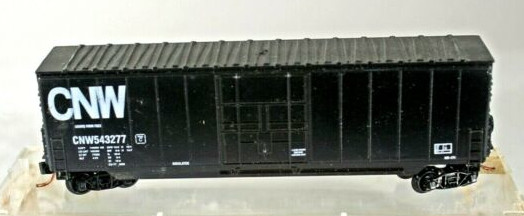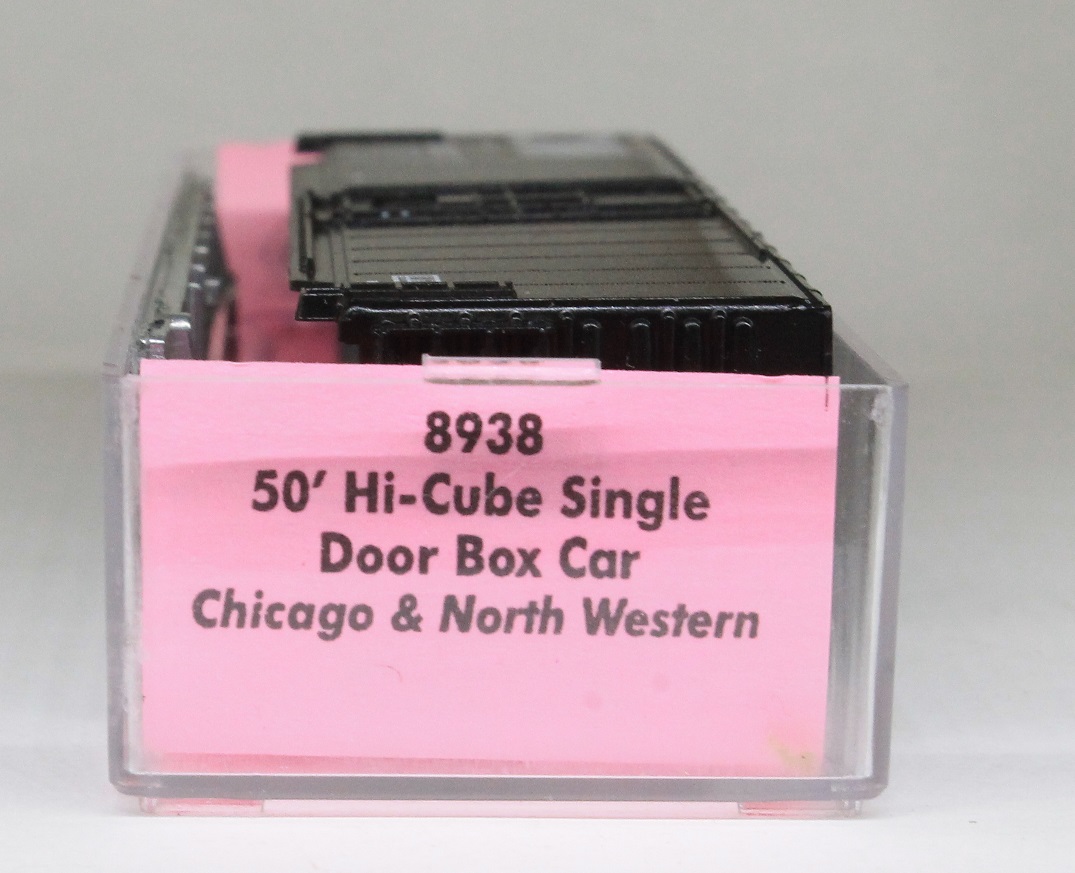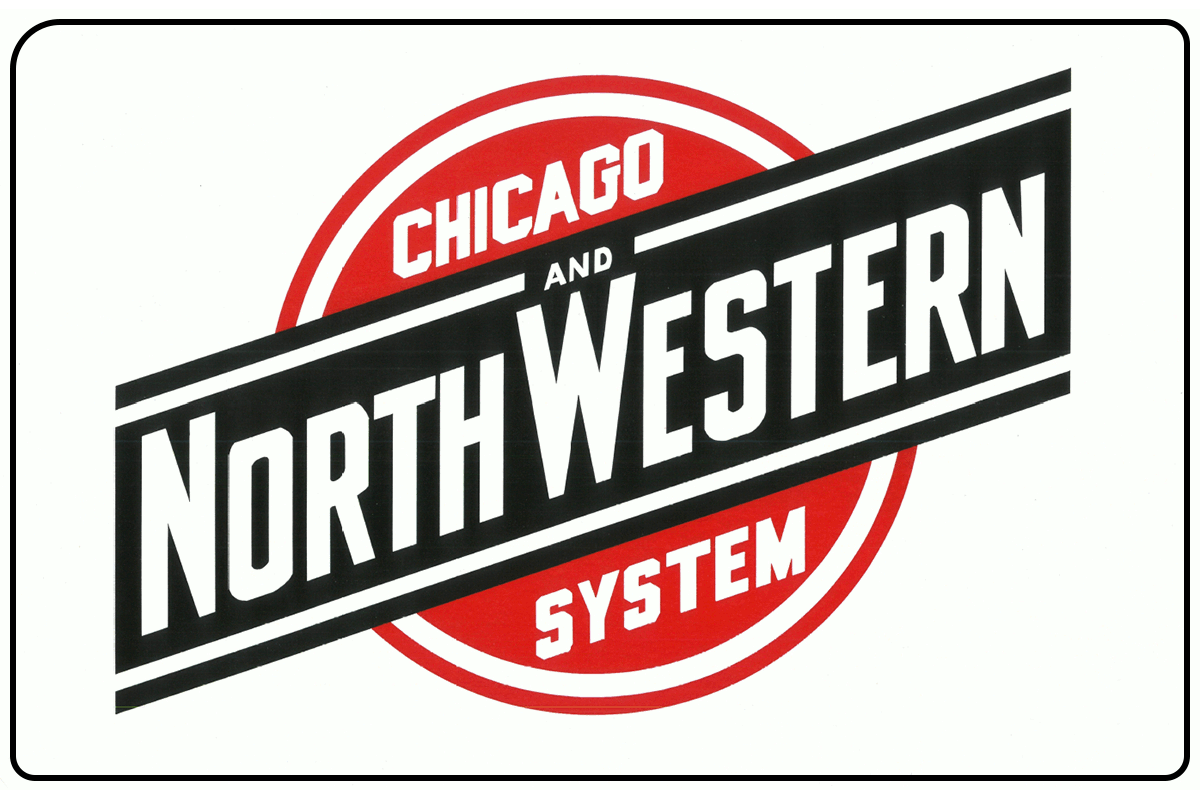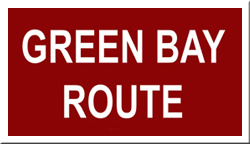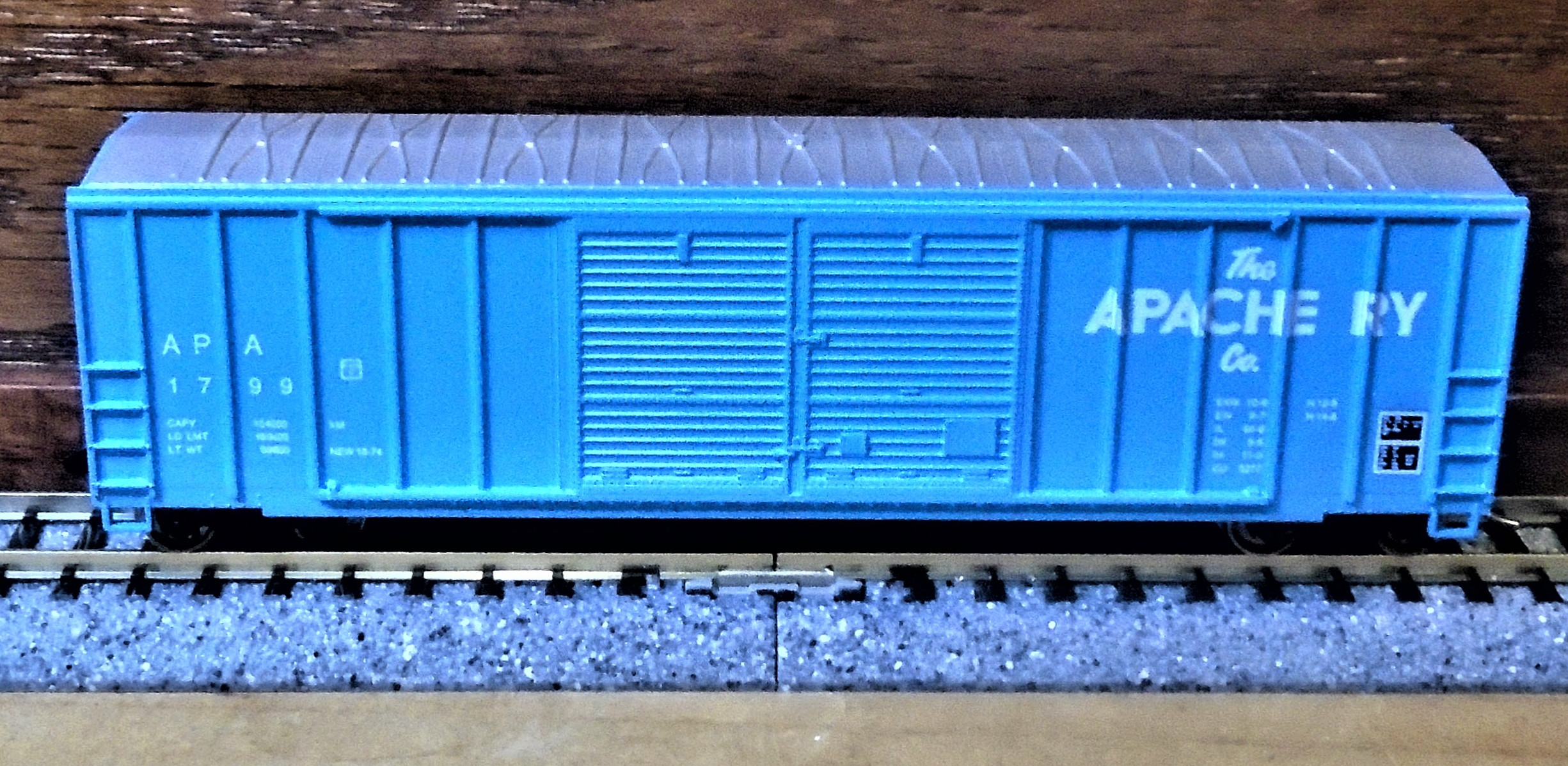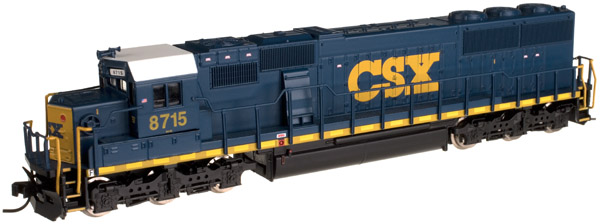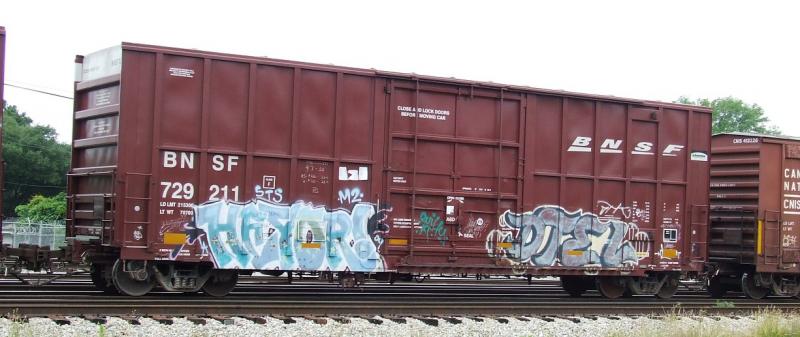Model Information: This MDC Roundhouse body style models a 50 Foot Hi-Cube Boxcar with a single plug door, riveted sides and no roofwalk. the model is reasonably close in detail to a typical Plate-F prototype boxcar such as is made by Greenbrier. The molds were acquired by Athearn/Horizon Hobbies in 2006 and are being re-released with upgrades (body-mount couplers and metal wheelsets) as of late (2017).
Prototype History: While the 40-foot boxcar was a standard design, and it did come in different setups depending on the type of freight being transported, it was not large enough for efficient mass commodity transportation. The 50-foot boxcar made its first appearance in the 1930s and steadily grew in popularity over the years, which further improved redundancies by allowing for even more space within a given car. Today, the 50-footer remains the common boxcar size. After the second world war ended, and steel became once again readily available, steel became the go-to choice for construction of boxcars. Pullman Standard and ACF were some of the most prolific builders of these cars.
In the 1960s, the flush, "plug" style sliding door was introduced as an option that provides a larger door to ease loading and unloading of certain commodities. The tight-fitting doors are better insulated and allow a car's interior to be maintained at a more even temperature.
The 50 foot hi-cube boxcar fleet is similar to a 50 foot standard car with an additional 2 feet of interior height. This is known as a "Plate F" boxcar. 50 foot Hi-Cube boxcars typically have a load capacity of 100 tons and are equipped with cushion underframes and plug doors. These cars are used primarily in rolled paper service as the extra height is needed to accommodate the larger rolls that are now commonplace. They can also be used for similar commodities handled in other 50’ or 60’ boxcars.
In the 1960s, the flush, "plug" style sliding door was introduced as an option that provides a larger door to ease loading and unloading of certain commodities. The tight-fitting doors are better insulated and allow a car's interior to be maintained at a more even temperature.
The 50 foot hi-cube boxcar fleet is similar to a 50 foot standard car with an additional 2 feet of interior height. This is known as a "Plate F" boxcar. 50 foot Hi-Cube boxcars typically have a load capacity of 100 tons and are equipped with cushion underframes and plug doors. These cars are used primarily in rolled paper service as the extra height is needed to accommodate the larger rolls that are now commonplace. They can also be used for similar commodities handled in other 50’ or 60’ boxcars.
Road Name History: The Chicago and North Western Transportation Company (reporting mark CNW) was a Class I railroad in the Midwestern United States. It was also known as the North Western. The railroad operated more than 5,000 miles (8,000 km) of track as of the turn of the 20th century, and over 12,000 miles (19,000 km) of track in seven states before retrenchment in the late 1970s.
Until 1972, when the company was sold to its employees, it was named the Chicago and North Western Railway. The C&NW became one of the longest railroads in the United States as a result of mergers with other railroads, such as the Chicago Great Western Railway, Minneapolis and St. Louis Railway and others.
By 1995, track sales and abandonment had reduced the total mileage back to about 5,000. The majority of the abandoned and sold lines were lightly trafficked branches in Iowa, Illinois, Minnesota, South Dakota and Wisconsin. Large line sales, such as those that resulted in the Dakota, Minnesota and Eastern Railroad further helped reduce the railroad to a mainline core with several regional feeders and branches.
The company was purchased by Union Pacific Railroad (UP) in April 1995 and ceased to exist.
Until 1972, when the company was sold to its employees, it was named the Chicago and North Western Railway. The C&NW became one of the longest railroads in the United States as a result of mergers with other railroads, such as the Chicago Great Western Railway, Minneapolis and St. Louis Railway and others.
By 1995, track sales and abandonment had reduced the total mileage back to about 5,000. The majority of the abandoned and sold lines were lightly trafficked branches in Iowa, Illinois, Minnesota, South Dakota and Wisconsin. Large line sales, such as those that resulted in the Dakota, Minnesota and Eastern Railroad further helped reduce the railroad to a mainline core with several regional feeders and branches.
The company was purchased by Union Pacific Railroad (UP) in April 1995 and ceased to exist.
Brand/Importer Information:  MDC Roundhouse was founded in California in 1938 and relocated in 1993 to Carson City, Nevada due to statewide restrictions on painting. MDC Roundhouse was a producer of both RTR (Ready-to-Run) and kit versions of N Scale rolling stock as well as RTR locomotives. They entered the N scale market in 1979 with a Thrall Hi-Side Gondola and a Hi-Cube Single Door Box Car. MDC Roundhouse was purchased by Horizon Hobbies in June of 2004, when its owner since 1938 C. H. Menteer retired, and merged into their Athearn line.
MDC Roundhouse was founded in California in 1938 and relocated in 1993 to Carson City, Nevada due to statewide restrictions on painting. MDC Roundhouse was a producer of both RTR (Ready-to-Run) and kit versions of N Scale rolling stock as well as RTR locomotives. They entered the N scale market in 1979 with a Thrall Hi-Side Gondola and a Hi-Cube Single Door Box Car. MDC Roundhouse was purchased by Horizon Hobbies in June of 2004, when its owner since 1938 C. H. Menteer retired, and merged into their Athearn line.
Unlike many of their contemporaries which contracted with European firms to produce their products, MDC made their own toolings. They made several popular body styles and produced them for road names that many other vendors (even Micro-Trains) wouldn't touch. This made them popular with modelers. Also, their un-assembled "kits" permitted a lower price point so they were popular with "runners" as well as "modelers".
Of particular interest was the attention given to modern 50 foot steel boxcars. They made some attempt to accurately mold the differences into distinct models to represent each of the major prototype manufacturers products. They have distinct toolings not only for the different products from FMC, BFF and PS, but also multiple models for each of these manufacturers including "standard" vs "Youngstown" doors and "waffle" vs. "rib" sides. In total they produced 13 different versions of the 50 foot steel boxcar.

Unlike many of their contemporaries which contracted with European firms to produce their products, MDC made their own toolings. They made several popular body styles and produced them for road names that many other vendors (even Micro-Trains) wouldn't touch. This made them popular with modelers. Also, their un-assembled "kits" permitted a lower price point so they were popular with "runners" as well as "modelers".
Of particular interest was the attention given to modern 50 foot steel boxcars. They made some attempt to accurately mold the differences into distinct models to represent each of the major prototype manufacturers products. They have distinct toolings not only for the different products from FMC, BFF and PS, but also multiple models for each of these manufacturers including "standard" vs "Youngstown" doors and "waffle" vs. "rib" sides. In total they produced 13 different versions of the 50 foot steel boxcar.
Item created by: gdm on 2018-04-27 20:10:15. Last edited by baggedbird on 2023-06-25 18:38:16
If you see errors or missing data in this entry, please feel free to log in and edit it. Anyone with a Gmail account can log in instantly.
If you see errors or missing data in this entry, please feel free to log in and edit it. Anyone with a Gmail account can log in instantly.


